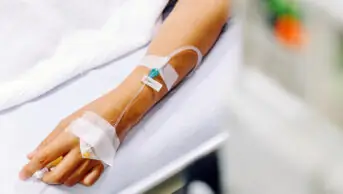Established in 2014, the Brighton–Lusaka Pharmacy Link (BLPL) connects Zambian pharmacists from the University Teaching Hospitals (UTH) and the University of Zambia with British pharmacists from Brighton and Sussex University Hospitals NHS Trust (BSUH), the University of Brighton and the University of Sussex. Together, the group reviews common interests, identifies system gaps in both England or Zambia, and develops joint educational goals — most recently focusing on antimicrobial stewardship (AMS) and infection prevention and control (IPC) in Zambia.
Misuse of antimicrobials, combined with poor IPC, can result in antimicrobial resistance (AMR). This may increase length of hospital stay, cost of treatment and the risk of adverse effects, as well as prolonged morbidity and mortality. Therefore, in 2018, the BLPL partnership was awarded 1 of 12 Commonwealth Partnerships for Antimicrobial Stewardship (CwPAMS) grants to implement AMS at UTH. To ensure engagement and sustainability, a pharmacist-led multidisciplinary team (MDT) was established, which included physicians from Brighton and Sussex Medical School, BSUH and UTH, as well as IPC team physicians, nurses and pharmacists from Ndola Teaching Hospital, Zambia.
In June 2019, a three-day workshop took place in Zambia for pharmacists, physicians, nurses and allied healthcare professionals at UTH to enhance AMS, and knowledge and practice of IPC and AMR. Sessions promoting World Health Organization (WHO)-recommended best practices of AMS, AMR and the use of the Global Point Prevalence Survey (Global-PPS) on antimicrobial use were delivered by the team from BSUH and Brighton and Sussex Medical School. Ndola Teaching Hospital conducted IPC training which emphasised the importance of effective hand washing and the use of alcohol-based hand sanitisers, and introduced the concept of ‘bare below elbow’ practice.
Educational games and a Zambian-specific AMS game (developed by BLPL based on user feedback) were played during the workshop.
Antimicrobial prescribing patterns at UTH have been reviewed as part of the partnership, along with interventions to improve AMS and implement IPC, as per international standards. These include:
- The development of a proactive MDT AMS committee to manage AMS and IPC activities throughout UTH;
- Conducting antimicrobial usage surveys using Global-PPS methodology;
- Developing a modified antibiotic prescribing chart (which is being trialled at UTH Lusaka);
- Creating the UTH antimicrobial guidelines (which is currently awaiting the hospital’s superintendent’s approval) and the AMS training programme.
In addition, IPC training has been provided to a variety of healthcare workers and students throughout UTH. CwPAMS purchased ‘Glowboxes’ — a teaching tool to show if hand washing is effective by using ultraviolet light to highlight the areas missed — for UTH and Ndola Teaching Hospital for effective hand-washing demonstrations, and posters were developed and printed to convey information appropriately. Teaching sessions were facilitated throughout UTH by the Ndola Teaching Hospital team, including training so that future sessions could be led by UTH-based staff.
A £1500 donation from BLHL allowed UTH to purchase a distiller for in-house production of WHO-standard alcohol-based hand sanitiser, with local support and training by the experienced pharmacist at Ndola Teaching Hospital. This production facility (now managed by Zambian pharmacists at UTH) has been operational since March 2020 and has produced more than 250L of alcohol-based hand sanitiser for UTH use to date. This local production has helped ensure IPC practices, such as use of wall-mounted hand sanitiser dispensers by hospital staff, patients and patrons, enabling the WHO-recommended ‘five moments of hand hygiene’ to be sustained at UTH. The potential to scale up similar initiatives to other local hospital settings also exists.
The recent AMS training programme is a module-based programme developed by a Zambian-led MDT and is currently undergoing review by the University of Zambia to provide continuous professional development accreditation. This programme covers the theory of AMR and IPC, as well as how to implement these into workplace AMS activities and programmes. It includes 20 hours of face-to-face training, which can be completed across a 3- or 10-day period, as well as lectures, workshops, problem-based learning, on-the-job training and evaluations.
Furthermore, the initiative has been timely and pivotal in the current COVID-19 pandemic. For example, the tools to reduce further spread of infections and reduce the costs associated with procuring individual hand sanitisers for healthcare professionals and caregivers at UTH has been extremely important. COVID-19 also highlights the importance of ensuring sustainable actions are implemented and continued beyond the life of the CwPAMs project at UTH — for example, the need to:
- Continue to provide budget for the raw materials required to manufacture hand sanitiser and to support the maintenance of wall-mounted sanitiser dispensers;
- Ensure that appropriate information is cascaded through IPC and AMS training programmes and posters;
- Continue the provision of antimicrobial guidelines;
- Continue the support to the AMS committee.
Despite the project being relatively small and at one tertiary hospital in Zambia, we have come to realise that the small, but significant efforts made by pharmacists at UTH can make a large contribution to AMS. This is especially pertinent during the COVID-19 pandemic. The findings of the project are to be disseminated and shared with the professional and government stakeholders to encourage improved national practice within and outside of Zambia. We trust this initiative will enhance sustainability in locally driven AMS knowledge, capacity-building and behavioural change.
Acknowledgements
The authors would like to thank the Brighton and Hove Rotary Club who donated wall-mounted hand sanitiser dispensers for use at the University Teaching Hospitals, to Focus Games for developing and producing the educational games, and to Soroptimists International, Lewes for donations to this cause.
David Chimbizgani Banda, clinical pharmacy specialist and former president of the Pharmaceutical Society of Zambia and Project Manager — Commonwealth Partnerships for Antimicrobial Stewardship (CwPAMS) Zambia Project
Aubrey Chichonyi Kalungia, lecturer and researcher, Department of Pharmacy, University of Zambia; chair of the Brighton–Lusaka Pharmacy Link, Zambia
Anja St. Clair Jones, consultant pharmacist, Brighton and Sussex University Hospitals NHS Trust; chair of the Brighton–Lusaka Pharmacy Link, UK
Fiona Rees, specialised pharmacist, Brighton and Sussex University Hospitals NHS Trust; chief pharmacist fellow, CwPAMS


